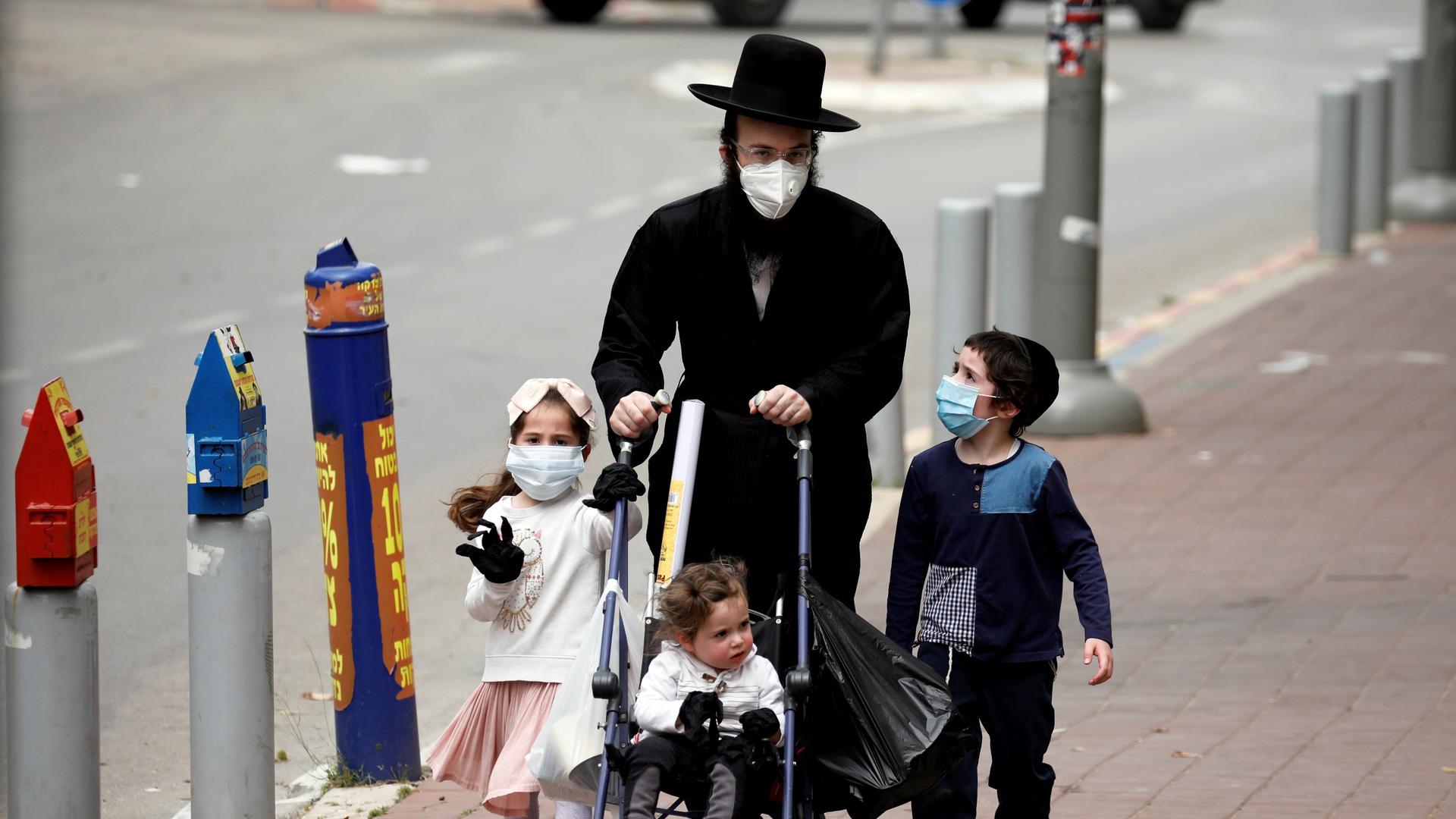The ultra-Orthodox — or Haredim, as they’re known in Israel — make up about 13% of Israel’s population. But they now account for a third of the country’s cases of the coronavirus.
Israel has more than 9,000 confirmed cases of the coronavirus. At least 60 people have died. One area outside Tel Aviv, Bnei Brak, a predominantly ultra-Orthodox city, has been especially hard hit. One Israeli health expert estimates that up to 40% of the city could now be infected.
Bnei Brak, a city of some 200,000, was declared a restricted zone on Thursday and police are limiting access.
Related: Taiwan’s success in fighting COVID-19 is overshadowed by global politics
After most of Israel went into isolation, Bnei Brak was slow to adopt the country’s social distancing regulations. As recently as the end of March, men there gathered for the funeral of a leading rabbi, cramming together on city streets. The funeral was caught on video — sparking outrage across the country.
The Israeli government issued orders on Tuesday requiring citizens to wear face masks in public to try to stem the spread of the novel coronavirus as the country enters a lockdown for the Jewish Passover holiday.
The government also approved a timeline for tightened travel restrictions throughout much of the week of Passover, which begins on Wednesday, when Jewish families gather for a meal commemorating the Biblical exodus from slavery in Egypt.
Israel has introduced the tougher measures in the hope the coronavirus will have been sufficiently contained once the Passover week is over to begin a gradual easing of restrictions.
Benjamin Brown, a professor Jewish thought at The Hebrew University of Jerusalem, said that the coronavirus regulations fly in the face of many ultra-Orthodox customs.
“It’s very difficult for them. It is a change of an entire mentality for them to change from such a certain way of life to the very individual self-secluded way of life that corona imposes.”
“It’s very difficult for them. It is a change of an entire mentality for them to change from such a certain way of life to the very individual self-secluded way of life that corona imposes.”
But he also pinned blame on ultra-Orthodox religious leaders who downplayed the threat of the coronavirus. One influential rabbi said that closing religious schools would be worse than the virus — and he told his followers that the Torah would protect them.
“They didn’t really grasp that it requires such a big change.”
There are other factors making ultra-Orthodox communities particularly susceptible to outbreaks. Large families who live together in tiny apartments are the norm, making it hard to isolate sick people. The community avoids mainstream media, TV and the internet, leaving some in the dark about the scope of the health crisis.
Health authorities are trying to get the message across to this insular population by putting up signs in ultra-Orthodox neighborhoods and sending cars that broadcast public service announcements on loudspeakers in Hebrew and Yiddish.
In Bnei Brak, police are taking even tougher steps. They have set up checkpoints around the city, and are most people from leaving or entering, as a way to contain the outbreak.
Related: Gaza Strip fears spread of the coronavirus, Palestinian epidemiologist says
Yakov Eisenthal is an ultra-Orthodox journalist who lives in Bnei Brak. He says state authorities don’t trust the Haredim, and the feeling is mutual. Eisenthal said he recently complained to his father that people in the neighborhood weren’t following the rules. He said his father expressed skepticism about the social distancing orders: “Why should we believe them?” he said his father asked him. “We don’t know that it’s not about politics.”
The lack of trust persists even though ultra-Orthodox have real political power in Israel. They have many members in parliament, and Health Minister Yaakov Litzman is himself ultra-Orthodox. Litzman came under fire for not doing more to halt large religious gatherings sooner. And now, he has been diagnosed with COVID-19.
“What’s happening now is that the streets are completely empty, except maybe a person here or there going shopping or to the pharmacy.”
Eisenthal says people in his neighborhood are now taking the virus seriously in part because they are scared. “What’s happening now is that the streets are completely empty, except maybe a person here or there going shopping or to the pharmacy.”
Related: What the US can learn from West Africa to slow the spread of coronavirus
The real test will come with the Passover holiday this week. Typically, this is a time for people to gather in huge numbers.
There’s another question facing the ultra-Orthodox: Will the coronavirus lead to a crisis of faith since rabbis erred in promising them their religion would protect them? Brown at Hebrew University says it’s more likely that the pandemic will only strengthen ultra-Orthodox beliefs.
“To some degree, they can see this kind of a test of faith, a thing that has to make them overcome their doubts.”
Or, as Eisenthal, the journalist from Bnei Brak put it, the ultra-Orthodox have been through much worse historically, and they have always remained devout believers.
Reuters contributed to this report.
The story you just read is accessible and free to all because thousands of listeners and readers contribute to our nonprofit newsroom. We go deep to bring you the human-centered international reporting that you know you can trust. To do this work and to do it well, we rely on the support of our listeners. If you appreciated our coverage this year, if there was a story that made you pause or a song that moved you, would you consider making a gift to sustain our work through 2024 and beyond?
